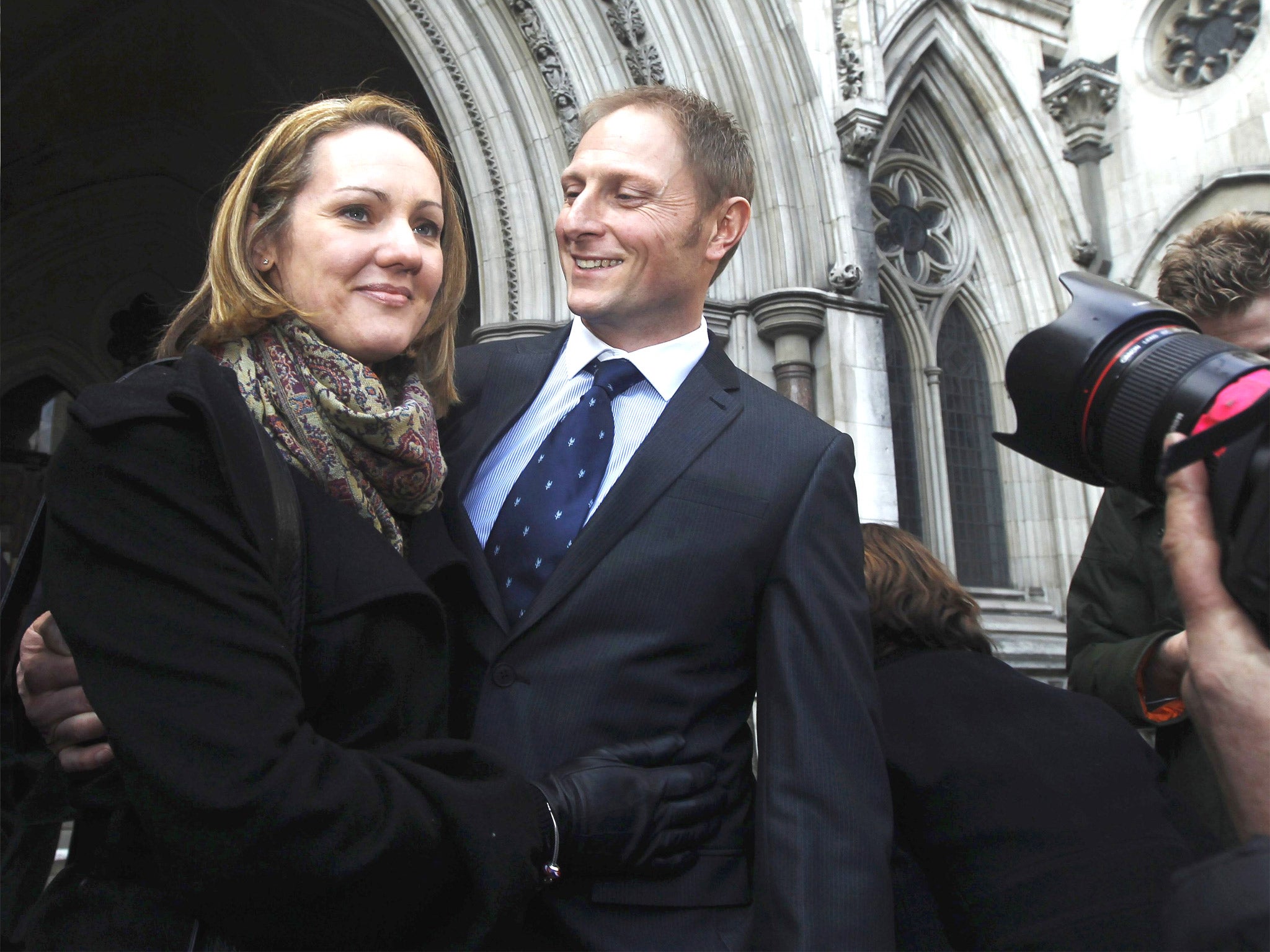SAS sniper Danny Nightingale conviction for illegally possessing pistol and ammunition overturned
Soldier admitted illegally possessing a Glock 9mm pistol and more than 300 rounds of ammunition at a court martial

Sergeant Danny Nightingale admitted he was feeling elated as the Court of Appeal quashed his conviction.
The SAS sniper, whose imprisonment caused national uproar after he was caught with a “war trophy” pistol, will now face a retrial but for a moment today his stoical façade dropped as he and his wife Sally conceded that they were very relieved by the judgement.
“The fact everything has been quashed is fantastic. But now we have got the retrial,” he said.
“The public have really got behind us and that has driven us and will continue to drive us,” added Mrs Nightingale, who has fought a determined campaign which generated 107,000 signatures on a petition and raised the issue in parliament.
Sgt Nightingale's sentence was overturned by the same court late last year when he was released from detention but the 38-year-old has always maintained his determination to clear his name.
The case has generated such attention that the Ministry of Defence is currently considering the legal implications of offering an amnesty to troops who have returned from tours of Iraq and Afghanistan with trophy arms.
Last night Sgt Nightingale's former commanding officer insisted it was the only sensible option at a time when many soldiers were coming home with post traumatic stress.
Lieutenant Colonel Richard Williams, who described Sgt Nightingale as a “quiet, tough, calm stalwart” of 22 SAS Regiment, said he was “delighted” by the Court of Appeal judgement.
“Frankly this should never have gone to court martial, given the mitigating circumstances,” he said. “The real question is whether hammering Danny Nightingale over the head was right or whether what is required is a national amnesty.”
Today Lord Chief Justice, Lord Judge was told that Sgt Nightingale had only admitted possessing the 9mm Glock, a gift from Iraqi soldiers he had been training, because pressure was put on him by the threat of a five year sentence. He was particularly fearful of ending up in a civilian jail separated from his wife and two little girls Alys, two, and five-year-old Mara, and the end of his army career, William Clegg QC told the court.
The Assistant Judge Advocate General Alistair McGrigor wrongly indicated before the court martial that he would face a severe sentence if found guilty but a more lenient penalty if he admitted the crime.
“It gave only one message to the defendant, namely that if he was to contest the case and be found guilty he would be looking at five years in prison,” explained Mr Clegg. Having been warned by his barrister that he only had a 10 per cent chance of being cleared, the threat of a severe sentence took away his “free choice” and “placed pressure” on him to admit the crime rather than continue denying it. The sentence, he added, was excessive.
As the three appeal court judges quashed the conviction and ordered a retrial, Lord Judge said: “It seems abundantly clear that the Judge Advocate (when speaking to the barristers before the court martial) was in fact giving an uninvited sentence indication.”
“Our conclusion is that the defendant's freedom of choice was indeed improperly narrowed.”
Sgt Nightingale was sentenced to 18 months by the court martial in November, after he admitted possessing a pistol as well as training ammunition. The soldier, who has served with distinction for 17 years including a “relentless, exhausting and dangerous” mission at the height of the insurgency in Iraq, maintained he had forgotten about the firearm, which was brought home in 2007 amongst his effects after he travelled back to the UK early to help repatriate two friends killed in action.
He also suffered from memory problems prompted by brain damage caused by a coma in 2009 after he collapsed during a five day endurance run through the Amazon to raise money for an armed forces charity. Psychiatrist Dr Susan Young said the brain injury could have led to him being more susceptible to pressure.
Having returned to fitness and duties, he was called back from a tour of Afghanistan in September 2011, when the weapon and ammunition were found in his quarters.
Today, David Perry QC, representing the Service Prosecuting Authority, argued: “No pressure was placed on the applicant and it was made clear that it was a matter for him.”
“In a case where there was, in truth, no defence to the charges the pressure was created by the advantages that arose from pleading guilty and acceptance of guilt in these circumstances,” he added.
News of his imprisonment in Colchester Military Corrective Training Centre led to a widespread campaign and even Prime Minister David Cameron expressing his sympathy. He was freed three weeks later after successfully appealing his sentence which was cut to 12 months suspended. However, he has decided to take the unusual step of appealing a guilty plea in a determined bid to clear his name.
Even if he is convicted by a retrial at court martial, Sgt Nightingale, who remains in the army, could not be imprisoned as the lesser sentence of the Court of Appeal will stand.
